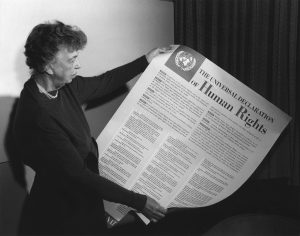Episode 3: Unveiling Justice: Evolution of Human Rights Since 1945

Welcome back to Teaching Big Concepts in Small Spaces, a podcast brought to you by the Center for Holocaust and Genocide Studies at the University of Minnesota.
In the third episode, we will delve into the mechanisms and institutions responsible for protecting human rights from the aftermath of World War II to the present. We explore the roles of local governments, the United Nations and its members in the safeguarding of human rights worldwide. We continue to discover a history of complexities and contradictions, as well as the important role that imperialism continues to play, even amidst decolonizing efforts.
Explore how human rights have changed in the aftermath of World War II, the creation of the Universal Declaration of Human Rights, and the challenges human rights activists continue to face in the present in Episode 3: Unveiling Justice: Evolution of Human Rights Since 1945.
Probing Questions
Describe the mechanisms and institutions responsible for protecting human rights.
Explain the role of local governments and the United Nations in promoting and safeguarding human rights.
Discuss the challenges and obstacles faced in upholding human rights on a global scale.
How was the Cold War relevant in the development of Human Rights? What are the three main ways in which the end of the Cold War influenced Human Rights?
What are the connections between the processes of decolonization and the contemporary advancements in Human Rights?
What are some new challenges that have arisen in the field of human rights since the turn of the 21st century?
Do you think it is important to research and learn the history of human rights in the past? How do you think that helps the development of human rights in the present?
Read the transcription of this episode here.
